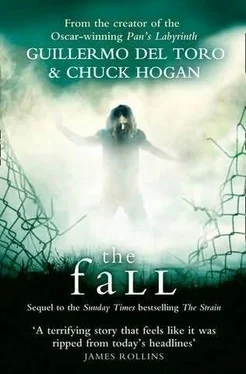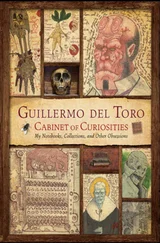They were inside a vast room of various contrapuntal noises. The hogs reacted to their presence with squeals of curiosity that frightened the children. They butted their tight pens and scraped their hooves against the straw-laden floor. Joni felt for the stalls lining either side of the group. The smell was of animal excrement, but also… something more foul. Something like charnel.
They had found the inside of the swine wing of a slaughterhouse, though none of them would have called it by that name.
The hum had become a voice for some of them. Those children felt compelled to break ranks, apparently responding to something familiar in the voice-and the chaperones had to round them up again, some by force. They initiated a new head count to make sure they were all still together.
While she was participating in the count, Joni finally heard the voice. She recognized it as her own, the strangest sensation-the voice seeming to originate inside her own head, hailing her, as in a dream.
They followed the call of the voice, walking forward down a wide ramp to a common area thick with the smell of charnel.
“Hello?” said Joni, her voice trembling-still hoping that the corny bus driver would answer them. “Can you help us?”
A being awaited them. A shadow akin to an eclipse. They felt its heat and sensed its immensity. The droning noise swelled, filled their heads beyond distraction, blanketing their most profound remaining sense-aural recognition-and leaving them in a state of near-suspended animation.
None of them heard the tender crinkling of the Master’s burned flesh as he moved.
THE OX-DRIVEN CART BUMPED OVER DIRT AND MATTED grass, rolling stubbornly through the countryside. The oxen were agreeable beasts, as are most castrated draught animals, their thin, braided tails swaying in sync like pendulum rods.
The driver’s hands were leathered where he gripped the driving rope. The man seated next to the driver, his passenger, wore a long black gown over black pants. Around his neck hung the long holy beads of a Polish priest.
Yet this young man dressed in holy vestments was not a priest. He was not even Catholic.
He was a Jew in disguise.
An automobile approached from behind. It drew even with them on the rutted road, a military vehicle transporting Russian soldiers, then passed them on the left. The driver did not wave or even turn his head in acknowledgment, using his long stick to prod the slowed oxen as they pushed through the smoky exhaust of the diesel engine. “Doesn’t matter how fast you travel,” he said, once the fumes cleared. “In the end we all arrive at the same destination, eh, Father?”
Abraham Setrakian did not answer. Because he wasn’t certain anymore that what the man said was true.
The thick bandage Setrakian wore around his neck was a ruse. He had learned to understand much of the Polish language, but he could not speak it well enough to pass.
“They beat you, Father,” said the oxcart driver. “Broke your hands.”
Setrakian regarded his young, mangled hands. The smashed knuckles had healed improperly during his time on the run. A local surgeon took pity on him and re-broke and reset the middle joints, which relieved some of the bone-on-bone grinding. He had some mobility in them now, more so than he might have hoped. The surgeon told him his joints would get progressively worse as he aged. Setrakian flexed them throughout the day, up to and then well past the point of pain, in an effort to increase their flexibility. The war cast a dark shadow over any man’s hope for a long and productive life, but Setrakian had decided that, however much time he had left, he would never be considered a cripple.
He did not recognize this part of the countryside upon his return-but then how would he? He had arrived to this locale inside a closed, windowless train. He had never left camp until the uprising, and then-on the run, deep into the woods. He looked now for the train tracks, but, apparently, they had been pulled up. The train’s path remained, however, its telltale scar running through the farmland. One year’s time was not long enough for nature to reclaim that trail of infamy.
Setrakian climbed down off the cart near the final turn, with a blessing for the peasant driver. “Do not stay here long, Father,” said the driver, before whipping his oxen into action. “There’s a pall over this place.”
Setrakian watched his beasts amble off, then walked up the beaten path. He came to a modest brick farmhouse set alongside an overgrown field tended to by a few workers. The extermination camp known as Treblinka was constructed to be impermanent. It was conceived as a temporary human slaughterhouse, constructed for maximum efficiency and intended to disappear completely once its purpose had been served. No tattooed arms as at Auschwitz; very little paperwork whatsoever. The camp was disguised as a train station complete with a false ticket window, a false station name (“Obermajdan”), and a fictitious list of connecting stations. The architects of the Operation Reinhard death camps had planned the perfect crime on a genocidal scale.
Soon after the prisoner uprising, Treblinka was indeed dismantled, torn down in the fall of 1943. The land was ploughed over, and a farm was erected on the site, with the intention of discouraging locals from trespassing and scavenging. The farmhouse was constructed using bricks recovered from the old gas chambers, and a former Ukrainian guard named Strebel and his family were installed as its occupants. The Ukrainian camp workers were former Soviet prisoners of war conscripted into service. The work of the camp-mass murder-affected one and all. Setrakian had seen for himself how these former prisoners themselves-especially the Ukrainians of German extraction, who were given greater responsibilities, such as commanding platoons or squads-succumbed to the corruption of the death camp and its opportunities for sadism as well as personal enrichment.
This man, Strebel, Setrakian could not conjure his face by name alone, but he remembered well the Ukrainians’ black uniforms, as well as their carbines-and their cruelty. Word had reached Setrakian that Strebel and his family had only recently abandoned this farmland, fleeing ahead of the advancing Red Army. But Setrakian, in his position as country priest some sixty miles away, also was privy to tales describing a plague of evil that had settled over the region surrounding the former death camp. It was whispered that the Strebel family had disappeared one night without a word, without taking any possessions with them.
It was this last tale that intrigued Setrakian the most.
He had come to suspect he had gone at least partly, if not fully, insane inside the death camp. Had he seen what he thought he’d seen? Or was this great vampire feasting on Jewish prisoners some figment of his imagination, a coping mechanism, a golem to stand for the Nazi atrocities his mind could not bear to accept?
Only now did he feel strong enough to seek an answer. He went out past the brick house, walking among the workers tilling the field-only to discover that they were not laborers at all, but locals bearing digging tools from home, turning over soil in search of Jewish gold and jewelry lost in the massacre. Yet all they kept unearthing were barbed wire and the occasional chunk of bone.
They looked upon him with suspicion, as though there was a distinct code of conduct for looters, never mind vaguely defined areas of claim. Even his vestments did not slow their digging or melt their resolve. A few may have slowed and looked down-not in shame exactly, but in the manner of those who know better-and then waited for him to continue on before resuming their grave-robbing.
Читать дальше
Конец ознакомительного отрывка
Купить книгу












